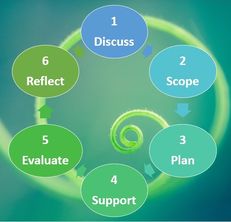How much do we teach the students at our colleges about sustainability and how do we know if what we're teaching is making a difference?
These are two critical questions facing the college sector as we support and enable a just transition.
This workshop brought together college curriculum leads, departmental heads, lecturers, principals, and sustainability specialists to learn about best practice on monitoring and evaluating Education for Sustainable Development / Learning for Sustainability in colleges.
The workshop was built around a six-step Framework for Monitoring and valuating ESD designed by and for universities (see image), a Quality Assurance Agency (QAA) funded project led by University of St Andrews with EAUC Scotland and others as project partners, and how this can be adapted for college contexts.
This framework aims to balance structure and context sensitivity. It provides a structure and suggestions that can help institutions improve the quality of their monitoring and their ESD practice. But this structure can be used flexibly: The framework is a learning spiral, meaning its six steps are:
- Flexible: To what extent and how any of the six steps is undertaken is up to the institution
- Iterative: Taking small steps and focussing on progress over perfection is encouraged with every step. Solutions can be tried out and be improved after reflection.
- Modular: The steps can be taken at any time and don't need to follow an order.
We heard case studies from Dundee & Angus College about curriculum mapping (Step 2- Scope), and South Devon College about supporting ESD (Step 4- Support) and evaluating impact (Step 5 - Evaluate), as well as stories and perspectives from participants in the workshop and through padlet.
Online resources
Aside from slides and resources to download on this page, these links might be useful to support you in your monitoring journey:
- Scoping/Mapping: SDG keyword Scanner - a tool designed by University of Galway, using Python code (but with a detailed description of how to do this) that automatically scans for SDG key words.
- The caveat here is that this can lead to inaccurate results: not every key word means topics are delivered with a link to sustainability. For example, under SDG 8, decent work and economic growth, the scanner currently searches for key words like "economy" tagging them as 'supportive'. But the concept of economy is not inherently sustainable on social and environmental dimensions.
- Using an automatic method also misses the crucial aspect of staff engagement that comes with "manual" mapping - but it may help to provide a cautiously interpreted baseline. Results from the scanning process can be critically evaluated through staff surveys to better align with what is actually being delivered.
Recording
Watch below
00:00-30:54 introduction and explanation of the 6-step monitoring framework for colleges
30:45-46:00 Christine Calder, Academic Development Lead at Dundee and Angus College, on efficient staff-led mapping
51.49-1:14:04 Laurence Frewin, Principal and CEO of South Devon College, on ways to support ESD and evaluate its impact.
1:14.24-1:19:43 Overview of existing examples and resources for Step 3 (Plan), and resources in development
1:19:47-1:38:00 Summary of breakout room discussions and final conclusions
Videos





 Except where otherwise stated, content on this site is
licensed under a Creative Commons Attribution 3.0 License.
Except where otherwise stated, content on this site is
licensed under a Creative Commons Attribution 3.0 License.
